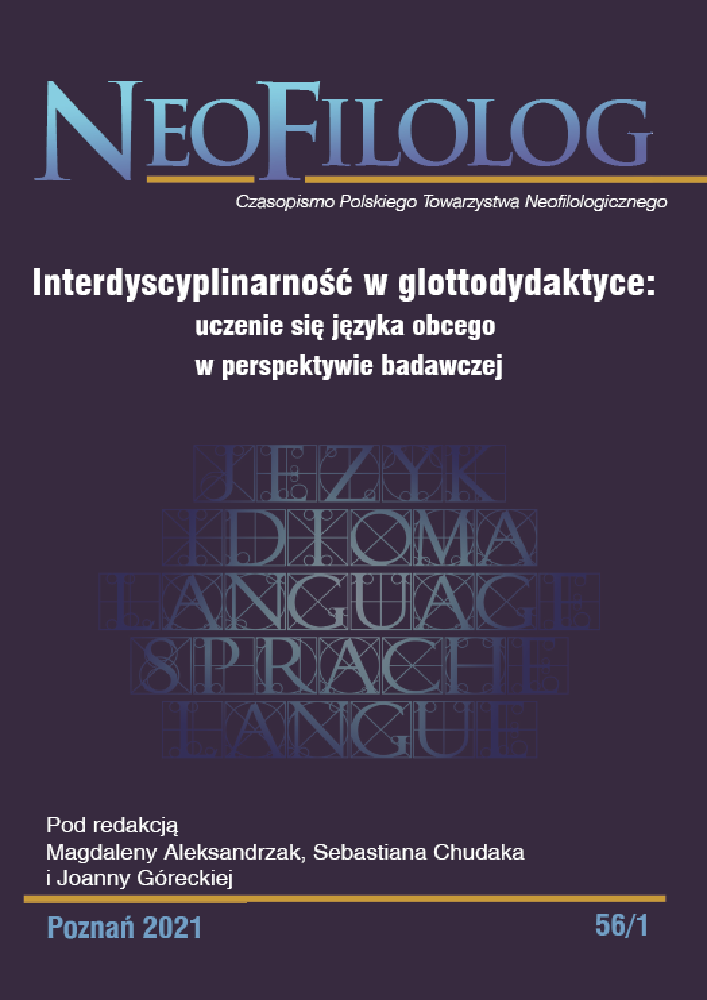Abstract
Second language acquisition (SLA) researchers have long been engaged in investigating the effect of a range of learner individual differences (IDs, e.g., motivation, anxiety and aptitude) on L2 learning and achievement. At the same time, there are no more than a few studies focusing of on learner personality and its place in SLA and the relationship between personality traits and other ID variables. One such underappreciated and thus poorly recognized personality trait is grit, understood as a combination of perseverance and passion for long-term goals. The present paper reports a study in which grit was investigated among advanced university students majoring in English with the help of a language-specific grit scale and semi-structured interviews. The empirical considerations are preceded by a small number of theoretical comments on the nature of grit and related research that was conducted to date. The paper ends with the discussion of future research directions and possible pedagogical implications.
References
Changlek A., Palanukulwong T. (2015), Motivation and grit: Predictors of language learning achievement. „Veridian E-Journal”, nr 8(4), s. 23-38.
Cox C.M. (1926), Genetic studies of genius: Vol. 2: The early mental traits of three hundred geniuses. Stanford, CA: Stanford University Press.
Galton F. (1892), Hereditary genius: An inquiry into its laws and conse-quences. London: Macmillan.
Dewaele J.-M. (2009), Individual differences in second language acquisition, (w:) Ritchie W.C., Bhatia T.K. (red.), The new handbook of second language acquisition. Bingley, UK: Emerald Group, s. 623-647.
Dewaele J.-M., Furnham A. (1999), Extraversion: The unloved variable in applied linguistic Research. „Language Learning”, nr 49(3), s. 509-544.
Dörnyei Z. (2007), Research methods in applied linguistics. Oxford: Oxford University Press.
Duckworth A.L., Peterson C., Matthews M.D., Kelly D.R. (2007), Grit: Perse-verance and passion for long term goals. „Journal of Personality and Social Psychology”, nr 92, s. 1087-1101.
Duckworth A.L., Quinn P.D., (2009), Development and validation of the Short Grit Scale (Grit-S). „Journal of Personality Assessment”, nr 91(2), s. 166-174.
Ericsson K.A., Charness N. (1994), Expert performance: Its structure and acquisition. „American Psychologist”, nr 49, s. 725-747.
Howe M.J.A. (1999), Genius explained. New York: Cambridge University Press.
James W. (1907), The energies of men. „Science”, nr 25, s. 321-332.
Kramer B., McLean S., Martin E.S. (2018), Student grittiness: A pilot study investigating scholarly persistence in EFL classrooms. Online: https://pdfs.sem anticscho-lar.org/3ac3/5dd875d09ee7838afbbd329aa2a133a9ecfc.pdf? _ga=2.252387849.1425726537.1588243762-820910953.1560095242 [DW 30.04.2020].
Kruk M., Zawodniak J. (2018), Boredom in practical English language classes: Insights from interview data, (w:) Szymański, L., Zawodniak, J., Łobodziec, A., Smoluk, M. (red.), Interdisciplinary views on the English language, literature and culture. Zielona Góra: Uniwersytet Zielonogórski, s. 177-191
Lake J. (2013), Positive L2 self: Linking positive psychology with L2 motiva-tion, (w:) Apple M.T., Da Silva D., Fellner T. (red.), Language learning motivation in Japan. Bristol: Multilingual Matters, s. 77-225.
Pawlak M. (2011), Research into language learning strategies: Taking stock and looking ahead, (w:) Arabski J., Wojtaszek A. (red.), Individual dif-ferences in SLA. Bristol: Multilingual Matters, s. 17-37.
Pawlak M. (2017), Overview of learner individual differences and their me-diating effects on the process and outcome of interaction, (w:) Gur-zynski-Weiss L. (red.), Expanding individual difference research in the interaction approach: Investigating learners, instructors, and other interlocutors. Amsterdam – Philadelphia: John Benjamins, s. 19-40.
Pawlak M. (2019), Investigating language learning strategies: Pitfalls, prospects and challenges. „Language Teaching Research”. Online: https://doi.org/ 10.1177/1362168819876156 [DW 30.04.2020].
Plonsky L., Sudina E. (w druku), Language-specific grit, achievement, and anxiety among L2 and L3 learners in Russia. „Modern Language Jour-nal”.
Robinson D., Gabriel N., Katchan O. (1994), Personality and second language learning. „Personality and Individual Differences”, nr 16(1), s. 143-157.
Sturman E.D., Zappala-Piemme K. (2017), Development of the grit scale for children and adults and its relation to student efficacy, test anxiety, and academic performance. „Learning and Individual Differences”, nr 59, s. 1-10.
Tabandeh F., Plonsky L., Teimouri Y. (2018), Perseverance and passion in L2 learning: Developing and validating a scale for L2 grit. Referat wygłoszony na konferencji w Montpellier (Francja): Research Methodology in the Field of Second Language Acquisition and Learning.
Teimouri Y., Plonsky L., Tabandeh F. (w druku), L2 grit: Passion and perseverance for second-language learning. „Language Teaching Research”.
Ushioda E. (2009), A person-in-context relational view of emergent motivation, self and identity, (w:), Dörnyei Z., Ushioda E. (red.), Motivation, language identity and the L2 self. Bristol, UK: Multilingual Matters, s. 215-228.
Waninge F., Dörnyei Z., de Bot K. (2014), Motivational dynamics in language learning: Change, stability, and context. „The Modern Language Jour-nal”, nr 98(3), s. 704-723.
Woodrow L. (2006), Anxiety and speaking English as a second language. „Regional Language Centre Journal”, nr 37(3), s. 308-328.
Yamashita T. (2018), Grit and second language acquisition: Can passion and perseverance predict performance in Japanese language learning? Amherst, MA: University of Massachusetts Amherst. https://scholarwo rks.umass.edu/masters_theses_2/679 [DW 30.04.2020].
License
Copyright (c) 2021 Mirosław Pawlak, Joanna Zawodniak, Mariusz Kruk

This work is licensed under a Creative Commons Attribution-NoDerivatives 4.0 International License.
Authors
Authors of texts accepted for publication in Neofilolog are required to complete, sign and return to the Editorial team’s office the Agreement for granting a royalty-free license to works with a commitment to grant a CC sub-license.
Under the agreement, the authors of the texts published in Neofilolog grant Adam Mickiewicz University in Poznań a non-exclusive, royalty-free license and authorize the use of Attribution-NoDerivatives 4.0 International (CC BY-ND 4.0) Creative Commons sub-license.
The authors retain the right to the free disposal of the work.
Users
Interested Internet users are entitled to use works that have been published in Neofilolog since 2017, under the following conditions:
▪ attribution – obligation to provide, together with the distributed work, information about the authorship, title, source (link to the original work, DOI) and the license itself.
▪ no derivatives – the work must be preserved in its original form. Without the author's consent, it is not possible to distribute the modified work in the form of translations, publications, etc.
Copyrights are reserved for all texts published since 2017.
Miscellaneous
Adam Mickiewicz University in Poznań retains the property right as a whole (layout, graphic form, title, cover design, logo etc.).
